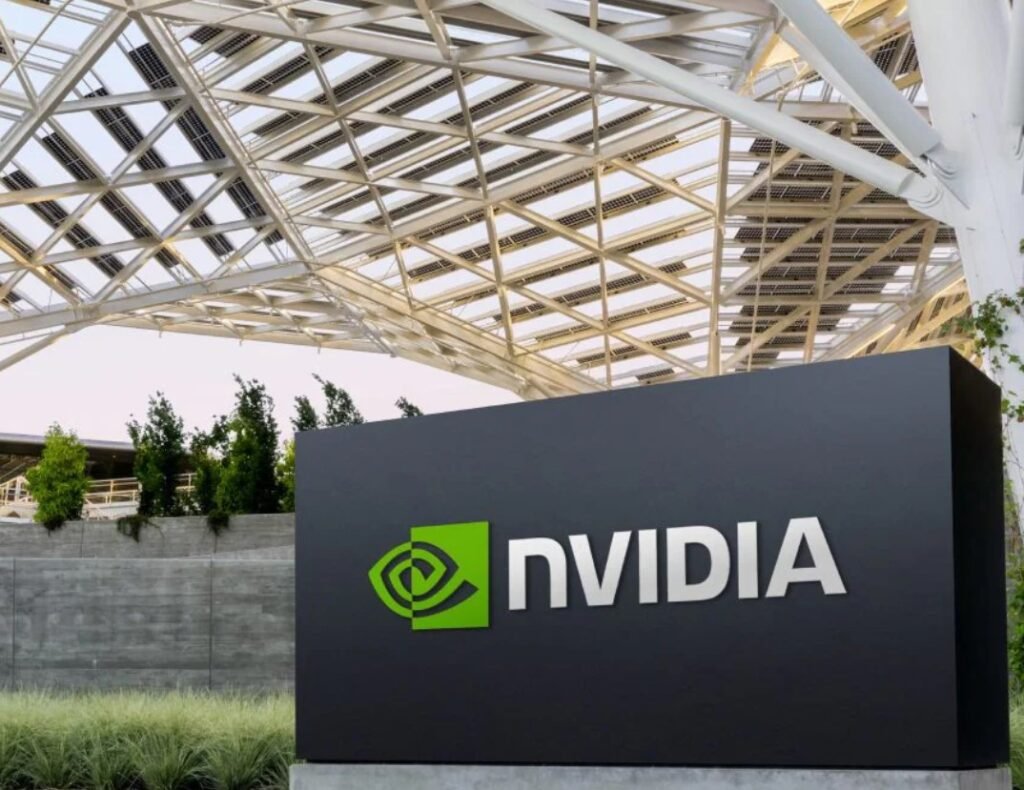Shares of Nvidia reached a new all-time high on Thursday, as a broader rally in U.S. chip stocks was ignited by an optimistic sales forecast from Taiwan Semiconductor Manufacturing Co. (TSMC). The forecast boosted investor confidence in the semiconductor industry, especially in AI applications, further cementing Nvidia’s position as a key player in the AI chip space.
The surge in Nvidia’s stock price followed TSMC’s announcement that it expects significant revenue growth, driven largely by demand for chips used in artificial intelligence. TSMC’s forecast reignited enthusiasm among investors, reaffirming the future growth of the semiconductor sector as AI continues to shape the market.
TSMC’s Optimistic Outlook Sets the Stage
TSMC, the world’s largest contract chipmaker, raised its revenue growth expectations for 2024. The company cited strong demand for AI chips as a key factor behind this optimism, estimating that sales from AI-related chips would make up a mid-teen percentage of its total annual revenue.
Following this announcement, U.S.-listed shares of TSMC climbed more than 11%, pushing the company’s market capitalization past the $1 trillion mark. The optimism surrounding TSMC’s forecast not only buoyed its own shares but also had a ripple effect across the semiconductor industry, lifting the stocks of key players like Nvidia, Advanced Micro Devices (AMD), and others.

- TSMC shares up 11%
- Market capitalization surpasses $1 trillion
- AI chip sales projected to be a mid-teen percentage of total revenue
Nvidia Rides the Wave of AI Demand
Nvidia, a leader in the AI chip sector and a major customer of TSMC, was among the biggest beneficiaries of the news. Shares of Nvidia surged nearly 4% to a record high of $140.89 during early trading on Thursday. Although the stock later pared back some of its gains, it still closed the day 2% higher, reflecting ongoing confidence in Nvidia’s dominant role in AI hardware.
Investors have long been bullish on Nvidia’s prospects as the company continues to supply AI processors to major tech firms. The skyrocketing demand for AI technologies, including machine learning, autonomous driving, and data analytics, has boosted Nvidia’s market value over the past two years.
Dan Coatsworth, an investment analyst at AJ Bell, noted the close relationship between TSMC’s strong results and Nvidia’s stock performance:
“Nvidia is one of TSMC’s major customers, so there is a direct read-across to the American chip firm in the Taiwanese company’s results.”
Broader Semiconductor Industry Gains Momentum
Nvidia wasn’t the only company to benefit from TSMC’s upbeat forecast. Smaller rival AMD saw its shares climb nearly 1%, while other semiconductor firms like Broadcom, Qualcomm, and Micron posted gains of between 1% and 3.6%. The semiconductor industry, already on a two-year growth spurt due to massive investments in AI and data centers by Big Tech, continues to be a focal point for investors.
- AMD shares up 1%
- Broadcom, Qualcomm, and Micron shares gain between 1% and 3.6%
Struggling chipmaker Intel also saw its stock rise by 1%, though the company is still facing challenges in its attempt to compete with TSMC in the advanced chip manufacturing space. Intel has been heavily investing in expanding its chip fabrication capabilities but analysts expect the company to face a tough battle to match TSMC’s advanced contract manufacturing for years to come.
AI: The Silver Lining in a Mixed Semiconductor Market
Despite the overall positive sentiment, the chip sector has had its share of challenges. Earlier this year, ASML, a key supplier of chipmaking equipment, issued a deep cut in its forecast, triggering concerns about a slower recovery in demand for non-AI semiconductors.
However, the buoyant demand for AI chips has offered some respite to investors worried about the broader semiconductor market. TSMC’s announcement that demand for AI-related chips and smartphones remains strong underscores that the AI sector is acting as a key driver of growth.
Coatsworth commented: “Fortunately, everything is fine in AI land. TSMC said demand was strong for both AI-related business and from smartphones, implying that the chip sector still has momentum.”
Challenges Ahead: Infrastructure and Costs
While the future for AI chips looks bright, the industry still faces hurdles. One of the primary challenges is the higher cost of manufacturing floating AI chips, particularly for advanced AI applications. Companies like TSMC and Nvidia are optimistic that these costs will decrease over time, with expectations that by 2040, the costs associated with producing AI chips will align more closely with traditional semiconductor projects.
In addition, infrastructure limitations, particularly in the U.K., present another obstacle to the rapid expansion of the AI chip industry. Ports and facilities in the U.K. are not yet equipped to handle the massive size of the new floating chip equipment, which will require billions of dollars in upgrades. Addressing these issues will be critical for countries like the U.K. that aim to remain competitive in the global semiconductor market.
Looking Ahead: A Bright Future for AI Chips
As AI continues to transform industries, the semiconductor sector, led by companies like TSMC and Nvidia, is poised to reap significant benefits. With AI chip demand expected to drive future growth, investors are likely to remain bullish on the sector for the foreseeable future.
The next challenge will be ensuring that the infrastructure and manufacturing costs can keep up with the soaring demand, while countries and companies alike must adapt to remain leaders in this rapidly evolving field.
